Roman Biographers Collection (12 vols.)
Digital Logos Edition
Overview
The Roman Biographers Collection brings together over 60 biographies of historically significant Roman figures, including some of the most powerful men to have ever lived: the Caesars. Suetonius humanizes these men who have been immortalized in stone with biographies that include the earliest accounts of Julius Caesar’s epileptic seizures and other detailed descriptions of the people who sat on the greatest throne the world has ever known. Suetonius’ Lives of the Caesars and Lives of Illustrious Men became source texts for later writers across various fields, including the historical writers Eutropius, Aurelius Victor, and Orosius. His influence on historical writing reached into the following centuries and inspired waves of biographical texts.
With On Great Generals and On Historians, Cornelius Nepos compares some of the most influential ancients—Roman and non-Roman—including generals, kings, and historians. His works were both popular and concise, and remain valuable resources today because of their accessibility and Nepos’ use of credible sources.
The Scriptores Historiae Augustae remains a perplexing and controversial piece of ancient literary history for its bizarre blending of fact and fiction, but it also contains snapshots of history recorded nowhere else. The text brings together 30 biographies, covering emperors, their heirs, the pretenders, and various other people who had claims to the throne.
This collection contains the complete texts in their Loeb Classical Library editions. Each text is included in its original Latin, with an English translation for easy side-by-side comparison. Logos’ language tools help you to go deeper into the Latin text and explore the biographers’ elegant language. Use the dictionary lookup tool to examine difficult Greek words and find every appearance of the same word in your library. Students and fans of ancient history, literature, Roman rulers, and Latin will enjoy these works and appreciate their significance.
Reviews
2 ratings
Key Features
- Over 60 biographies of historically significant Romans and non-Romans
- Coverage of ancient historical periods found nowhere else
- Loeb Classical Library editions
Product Details
- Title: Roman Biographers Collection
- Translators: J. C. Rolfe and David Magie
- Series: Loeb Classical Library
- Publisher: Harvard University Press and Macmillan and Co.
- Volumes: 12
- Pages: 2,928
Individual Titles
- Cornelius Nepos: On Great Generals. On Historians translated by J. C. Rolfe
- Cornelius Nepos: On Great Generals. On Historians: Latin Text by Cornelius Nepos
- Suetonius vol. 1: The Lives of the Caesars translated by J. C. Rolfe
- Suetonius vol. 1: The Lives of the Caesars: Latin Text by C. Suetonius Tanquillus
- Suetonius vol. 2: The Lives of the Caesars, The Lives of Illustrious Men translated by J. C. Rolfe
- Suetonius vol. 2: The Lives of the Caesars, The Lives of Illustrious Men: Latin Text by C. Suetonius Tanquillus
- The Scriptores Historiae Augustae, vol. 1 translated by David Magie
- The Scriptores Historiae Augustae, vol. 1: Latin Text by Aelius Spartianus, Julius Capitolinus, Vulcacius Gallicanus, and Aelius Lampridius
- The Scriptores Historiae Augustae, vol. 2 translated by David Magie
- The Scriptores Historiae Augustae, vol. 2: Latin Text by Aelius Spartianus, Julius Capitolinus, Vulcacius Gallicanus, and Aelius Lampridius
- The Scriptores Historiae Augustae, vol. 3 translated by David Magie
- The Scriptores Historiae Augustae, vol. 3: Latin Text by Aelius Spartianus, Julius Capitolinus, Vulcacius Gallicanus, and Aelius Lampridius
This title is included in the following collections
You can save when you purchase this product as part of a collection.
Classic Catholic Scholarship C...
$3,413.99$3,413.99Classic Scholarship Collection...
$12,102.39$7,299.99
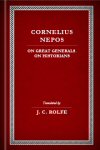
Cornelius Nepos: On Great Generals. On Historians
- Author: Cornelius Nepos
- Translator: J. C. Rolfe
- Publisher: Harvard University Press
- Publication Date: 1929
- Pages: 184
This volume contains J. C. Rolfe’s translation of Cornelius Nepos’ parallel biographies of famous Roman and non-Roman men, including the lives of non-Roman generals, a chapter on kings, and two historians.
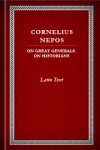
Cornelius Nepos: On Great Generals. On Historians: Latin Text
- Author: Cornelius Nepos
- Translator: J. C. Rolfe
- Publisher: Harvard University Press
- Publication Date: 1929
- Pages: 184
This volume contains the Latin text of Cornelius Nepos’ parallel biographies of famous Roman and non-Roman men, including the lives of non-Roman generals, a chapter on kings, and two historians.

Suetonius vol. 1: The Lives of the Caesars
- Author: C. Suetonius Tranquillus
- Translator: J. C. Rolfe
- Publisher: Macmillan and Co.
- Publication Date: 1914
- Pages: 249
This volume contains J. C. Rolfe’s translation of the first four books of Suetonius’ The Lives of the Caesars.
Contents:
- The Lives of the Caesars
- Book I. The Deified Julius
- Book II. The Deified Augustus
- Book III. Tiberius
- Book IV. Gaius Caligula
- Stemma of the Julio-Claudian Emperors
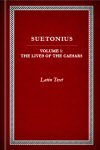
Suetonius vol. 1: The Lives of the Caesars: Latin Text
- Author: C. Suetonius Tranquillus
- Translator: J. C. Rolfe
- Publisher: Macmillan and Co.
- Publication Date: 1914
- Pages: 249
This volume contains the Latin text of the first four books of Suetonius’ The Lives of the Caesars.
Contents:
- The Lives of the Caesars
- Book I. The Deified Julius
- Book II. The Deified Augustus
- Book III. Tiberius
- Book IV. Gaius Caligula
- Stemma of the Julio-Claudian Emperors

Suetonius vol. 2: The Lives of the Caesars, The Lives of Illustrious Men
- Author: C. Suetonius Tranquillus
- Translator: J. C. Rolfe
- Publisher: Harvard University Press
- Publication Date: 1914
- Pages: 278
This volume contains J. C. Rolfe’s translation of the remaining four books of Suetonius’ The Lives of the Caesars, as well as The Lives of Illustrious Men.
Contents:
- The Lives of the Caesars
- Book V. The Deified Claudius
- Book VI. Nero
- Book VII. Galba, Otho, and Vitellius
- Book VIII. Gaius Caligula
- Stemma of the Julio-Claudian Emperors
- The Lives of Illustrious Men
- Prefatory Note
- Bibliographical Note
- Grammarians and Rhetoricians
- Grammarians
- Rhetoricians
- Poets
- Terence
- Vergil
- Horace
- Tibullus
- Persius
- Lucan
- The Lives of Pliny the Elder and Passienus Crispus
- Index
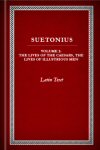
Suetonius vol. 2: The Lives of the Caesars, The Lives of Illustrious Men: Latin Text
- Author: C. Suetonius Tranquillus
- Translator: J. C. Rolfe
- Publisher: Harvard University Press
- Publication Date: 1914
- Pages: 278
This volume contains the Latin text of the remaining four books of Suetonius’ The Lives of the Caesars, as well as The Lives of Illustrious Men.
Contents:
- The Lives of the Caesars
- Book V. The Deified Claudius
- Book VI. Nero
- Book VII. Galba, Otho, and Vitellius
- Book VIII. Gaius Caligula
- Stemma of the Julio-Claudian Emperors
- The Lives of Illustrious Men
- Prefatory Note
- Bibliographical Note
- Grammarians and Rhetoricians
- Grammarians
- Rhetoricians
- Poets
- Terence
- Vergil
- Horace
- Tibullus
- Persius
- Lucan
- The Lives of Pliny the Elder and Passienus Crispus
- Index

The Scriptores Historiae Augustae, vol. 1
- Authors: Aelius Spartianus, Julius Capitolinus, Vulcacius Gallicanus, and Aelius Lampridius
- Translator: David Magie
- Publisher: Harvard University Press
- Publication Date: 1921
- Pages: 247
This volume contains David Magie’s translation of 12 biographies by four different Roman biographers. The text presents itself as historical, though historians debate over the authenticity of its authorship and content. Some facts included in the texts are verified by other sources, some are the only documentation of specific events, and some of them are clearly fictitious. David Magie addresses this debate and draws from previous scholarship on the controversy.
Contents:
- Hadrian by Aelius Spartianus
- Aelius by Aelius Spartianus
- Antoninus Pius by Julius Capitolinus
- Marcus Aurelius Antoninus by Julius Capitolinus
- Lucius Verus by Julius Capitolinus
- Avidius Cassius by Vulcacius Gallicanus
- Commodus by Aelius Lampridius
- Pertinax by Julius Capitolinus
- Didius Julianus by Aelius Spartianus
- Septiumius Severus by Aelius Lampridius
- Pescennius Niger by Aelius Spartianus
- Clodius Albinus by Julius Capitolinus
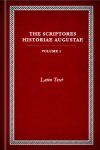
The Scriptores Historiae Augustae, vol. 1: Latin Text
- Authors: Aelius Spartianus, Julius Capitolinus, Vulcacius Gallicanus, and Aelius Lampridius
- Translator: David Magie
- Publisher: Harvard University Press
- Publication Date: 1921
- Pages: 246
This volume contains the Latin text of 12 biographies by four different Roman biographers. The text presents itself as historical, though historians debate over the authenticity of its authorship and content. Some facts included in the texts are verified by other sources, some are the only documentation of specific events, and some of them are clearly fictitious.
Contents:
- Hadrian by Aelius Spartianus
- Aelius by Aelius Spartianus
- Antoninus Pius by Julius Capitolinus
- Marcus Aurelius Antoninus by Julius Capitolinus
- Lucius Verus by Julius Capitolinus
- Avidius Cassius by Vulcacius Gallicanus
- Commodus by Aelius Lampridius
- Pertinax by Julius Capitolinus
- Didius Julianus by Aelius Spartianus
- Septiumius Severus by Aelius Lampridius
- Pescennius Niger by Aelius Spartianus
- Clodius Albinus by Julius Capitolinus

The Scriptores Historiae Augustae, vol. 2
- Authors: Aelius Spartianus, Julius Capitolinus, and Aelius Lampridius
- Translator: David Magie
- Publisher: Harvard University Press
- Publication Date: 1924
- Pages: 243
This volume contains David Magie’s translation of nine biographies by three different Roman biographers. The text presents itself as historical, though historians debate over the authenticity of its authorship and content. Some facts included in the texts are verified by other sources, some are the only documentation of specific events, and some of them are clearly fictitious. David Magie addresses this debate and draws from previous scholarship on the controversy.
Contents:
- Caracalla by Aelius Spartianus
- Geta by Aelius Spartianus
- Opellius Macrinus by Julius Capitolinus
- Diadumenianus by Aelius Lampridius
- Elagabalus by Aelius Lampridius
- Severus Alexander by Aelius Lampridius
- The Two Maximini by Julius Capitolinus
- The Three Gordians by Julius Capitolinus
- Didius Julianus by Julius Capitolinus
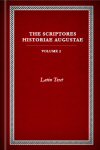
The Scriptores Historiae Augustae, vol. 2: Latin Text
- Authors: Aelius Spartianus, Julius Capitolinus, and Aelius Lampridius
- Translator: David Magie
- Publisher: Harvard University Press
- Publication Date: 1924
- Pages: 242
This volume contains the Latin text of nine biographies by three different Roman biographers. The text presents itself as historical, though historians debate over the authenticity of its authorship and content. Some facts included in the texts are verified by other sources, some are the only documentation of specific events, and some of them are clearly fictitious.
Contents:
- Caracalla by Aelius Spartianus
- Geta by Aelius Spartianus
- Opellius Macrinus by Julius Capitolinus
- Diadumenianus by Aelius Lampridius
- Elagabalus by Aelius Lampridius
- Severus Alexander by Aelius Lampridius
- The Two Maximini by Julius Capitolinus
- The Three Gordians by Julius Capitolinus
- Didius Julianus by Julius Capitolinus

The Scriptores Historiae Augustae, vol. 3
- Author: Trebellius Pollio and Flavius Vopiscus
- Translator: David Magie
- Publisher: Harvard University Press
- Publication Date: 1932
- Pages: 265
This volume contains David Magie’s translation of nine biographies by Trebellius Pollio and Flavius Vopiscus and an index. The text presents itself as historical, though historians debate over the authenticity of its authorship and content. Some facts included in the texts are verified by other sources, some are the only documentation of specific events, and some of them are clearly fictitious. David Magie addresses this debate and draws from previous scholarship on the controversy.
Contents:
- The Two Valerians by Trebellius Pollio
- The Two Gallieni by Trebellius Pollio
- The Thirty Pretenders by Trebellius Pollio
- The Deified Claudius by Trebellius Pollio
- The Deified Aurelian by Flavius Vopiscus
- Tacitus by Flavius Vopiscus
- Probus by Flavius Vopiscus
- Firmus, Saturninus, Proculus, Bonosus by Flavius Vopiscus
- Carus, Carinus, Numerian by Flavius Vopiscus
- Index of Names
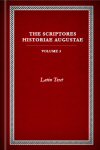
The Scriptores Historiae Augustae, vol. 3: Latin Text
- Author: Trebellius Pollio and Flavius Vopiscus
- Translator: David Magie
- Publisher: Harvard University Press
- Publication Date: 1932
- Pages: 264
This volume contains the Latin text of nine biographies by Trebellius Pollio and Flavius Vopiscus and an index. The text presents itself as historical, though historians debate over the authenticity of its authorship and content. Some facts included in the texts are verified by other sources, some are the only documentation of specific events, and some of them are clearly fictitious.
Contents:
- The Two Valerians by Trebellius Pollio
- The Two Gallieni by Trebellius Pollio
- The Thirty Pretenders by Trebellius Pollio
- The Deified Claudius by Trebellius Pollio
- The Deified Aurelian by Flavius Vopiscus
- Tacitus by Flavius Vopiscus
- Probus by Flavius Vopiscus
- Firmus, Saturninus, Proculus, Bonosus by Flavius Vopiscus
- Carus, Carinus, Numerian by Flavius Vopiscus
- Index of Names
About the Authors
Cornelius Nepos (c. 110–25 BC) was a Roman biographer who lived during the reign of Augustus. Nepos’ simplicity made his writings popular selections for people studying Latin. Most of his writings have been lost, but they are mentioned by other ancient writers such as Pliny the Younger, Catullus, Ausonius, Aulus Gellius, and Charisius.
C. Suetonius Tranquillus (c. AD 69–122) was a Roman biographer and a friend of Pliny the Younger. Pliny said Suetonius was “quiet and studious, a man dedicated to writing.” Their friendship helped Suetonius climb his way to the emperor’s staff, serving as secretary of studies and director of Imperial archives under Trajan. During the reign of Hadrian, he served as the emperor’s secretary until he was dismissed for an affair with the Empress Vibia Sabina.
Aelius Spartianus, Julius Capitolinus, Vulcacius Gallicanus, Aelius Lampridius, Trebellius Pollio, and Flavius Vopiscus were possibly Roman biographers, though scholars are still not certain if they were real people or fabricated authors included as part of a satirical text.
About the Translators
John Carew Rolfe (1859–1943) was an American classical scholar. He graduated from Harvard in 1881, and received his PhD from Cornell in 1885. He taught at Cornell, Harvard, the University of Michigan, and the University of Pennsylvania. He was a professor at the American School of Classical Studies and the American Academy in Rome, and from 1910–1911 he was president of the American Philological Association. Rolfe translated several Latin authors for the Loeb Classical Library, including Ammianus Marcellinus, Cornelius Nepos, Aulus Gellius, Quintus Curtius, Sallust, and Suetonius.
David Magie (1877–1960) was a professor of classics at Princeton University and a member of the staff of the American Commission to Negotiate Peace. Both he and his father were Princeton graduates. Magie was a part of the university as an undergraduate, graduate student, and faculty member for over 50 years in total. In 1930, he retired from teaching to devote himself to research. His works include the translation of Historia Augusta and Roman Rule in Asia Minor.
Reviews
2 ratings

Andrew Lim
8/8/2024
Dr. Gordon Arthur
1/9/2019